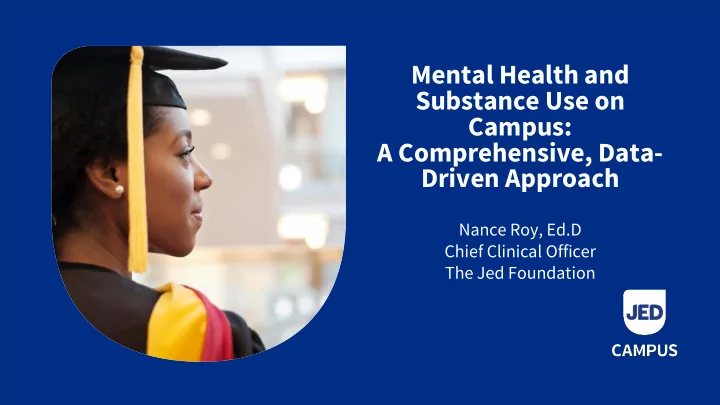

Mental Health and Substance Use on Campus: A Comprehensive, Data- Driven Approach Nance Roy, Ed.D Chief Clinical Officer The Jed Foundation
Who We Are • Origin – JED’s story • History – Evolution over the past 19 years 2
Among our 21 million college students . . . . . . at some point this year: 3 out of 5 felt overwhelming anxiety 1 out of 3 felt too depressed to function 1 out of 3 binge drank regularly 1 out of 8 abused prescription drugs 12% had serious thoughts of suicide 8% engaged in self-harm 2% attempted suicide 1,400 died by suicide Source: ACHA-NCHA Survey 2018
Impa pact ct on Acad ademic mic Perf rforma ormance ce
2016 – 17 Healthy Minds Survey Data N = 8000 first year students, 48 campuses Of all first year students with diagnosed depression: 94% reported that mental health difficulties had impaired their academic performance over the past month. Positive Negative Students that strongly agreed they would persist to graduation: Positive for 30% depresssion Negative for 1/3 of first year students screened 56% depression positive for depression
JED’S Comprehensive Framework We believe in a comprehensive , public health approach to promoting emotional well- being and preventing suicide and serious substance use . • Campus-wide responsibility • Support from Senior Leadership 6
Develop and Support Life Skills ▪ Resilience – struggle with basic life skills – little opportunity for independent navigation ▪ Basic life skills – money management, medical care, sleep hygiene, nutrition, exercise, connection between wellness and academic performance ▪ Cross campus offerings – campus wide support 7
Connectedness and Support ▪ Loneliness single most reported struggle among first years ▪ Students turn to peers first – Ad Council ▪ Greek and athletic systems, peer mentors - wellness ambassadors ▪ Programs to promote tolerance/inclusiveness, disconnected students - EMHF ▪ Adequate spaces for students to gather organically/informally
Identify Students at Risk ▪ Collecting mental health and substance history from incoming students ▪ Training on how to identify, reach out to and if needed, refer students who may be struggling ▪ Wide, targeted, strategic ▪ How to Help a Friend ▪ Behavioral Intervention/Care Teams (Electronic) reporting system
Increase Help-seeking ▪ No wrong door for support – access across campus ▪ Campus culture is open about mental health and value of help- seeking – storytelling ▪ Online screening tools, CBT ▪ Campaigns designed and delivered by students 10
Mental Health and Substance Abuse Services ▪ Health services routinely screens for mental health and substance issues ▪ Collaboration/close communication between CC and HS ▪ Medication management ▪ Referral system, MOU’s ▪ Naloxone ▪ Recovery community ▪ Policy for prescribing opiates ▪ Education re: danger of combining opiates and alcohol 11
Crisis Management ▪ Policies to address: ▪ LOA’s – medical leaves, mandatory leaves, return from leave, AOD – clear and transparent, well publicized ▪ Insurance ▪ Health insurance ▪ Tuition insurance ▪ Parental notification ▪ Medical amnesty ▪ Postvention protocols – HEMHA Postvention Guide 12
Means Restrictions and Environmental Safety ▪ Environmental scanning done ▪ Roof, window, closet rod safety ▪ Firearms policy ▪ Prescription drug monitoring and return ▪ Lab safety ▪ ‘Means Matters’: www.hsph.harvard.edu/means -matter 13
JED Campus Empowering schools to enhance student mental health, substance abuse and suicide prevention efforts
Equity in Mental Health Framework and Pilot Project 2018-2020
Recommend
More recommend